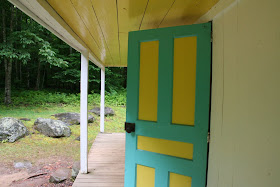With a weather forecast of rain for day after day after day, we knew we couldn’t stay at home without going stir crazy. A scenic drive came to mind and we chose Roaring Fork Motor Nature Trail.
Roaring Fork Motor Nature trail is a 6-mile, one-way loop through Roaring Fork historic district, one of those several pioneer communities like Cade’s Cove and Cataloochee which the Park maintains for their historical significance. Along the way, Roaring Fork, one of the larger streams in the Smokies, makes its presence known as it tumbles over rocks in its rush toward the Little Pigeon River in Gatlinburg.
Roaring Fork is on the Tennessee side of the mountain and we drove from Cherokee to Gatlinburg along Newfound Gap Road. We make this 30-mile drive often, but never tire of it. On clear days, there are some awesome views. On rainy days like today, the higher peaks were shrouded in clouds. The fog or heavy mist adds an eery dimension to the landscape. I just love it in all conditions. Of course, I had my camera at the ready and a sharp eye out for that elusive bear.
We got to Gatlinburg early in the day and traffic wasn’t too bad. I suppose those vacationers were still in bed or at one of several pancake places.
Roaring Fork Motor Nature Trail begins off Cherokee Orchard Road just past the Rainbow Falls Trailhead. Rainbow Falls is a very popular destination for hikers so there are two large parking lots to accommodate that trail. Rainbow Falls is about 2.5 miles from the trailhead, but beyond the Falls the trail continues all the way to Mt LeConte.
 |
| Bud Ogle's Grist Mill |
 |
| Ogle's home |
 |
| and barn |
The very early 1800s saw the first settlers come to what is now Gatlinburg. Over the next years, as the families grew, they began to spread out. By the mid 1800 several families were living in the Roaring Fork area and by 1900 there was a school, church, and general store.
 |
| The small cabin at Jim Bales place |
 |
| Corncrib |
 |
| Ephraim Bales' home |
 |
| Alfred Reagan's home |
After a couple of old homes, they start to all look the same, so we soon grew weary of running through raindrops in wet grass to see one more log cabin. However, the Alfred Reagan place was different. Alfred paneled and painted his house which was built in the “saddlebag” design--there is one fireplace in the middle of the house rather than a fireplace at each end.
After our ride through Roaring Fork we headed back out to Gatlinburg. Traffic was jam packed and creeping along. It reminded us again of why we try to avoid Gatlinburg.
Re-entering the Park, we stopped at the main Visitor Center at Sugarlands. There is a small “museum” here. I usually think of a museum in terms of antiques, but this was what I would call a “nature museum”. On display were the various plants and animals found in the park. Most of the animals were real and had been artfully displayed after a visit to the taxidermist. The plants seemed to be plastic, mostly. However, I could stand there and study the needles and cones and now think I might be able to tell the difference between a Fraser Fir and a Spruce. It was also nice to see what a Dutchman’s pipe looks like.
We wanted to see the film which is only shown at this visitor center, however, a “special ranger program” was being offered instead. It was all about how the pioneers built those log cabins, barns, and corncribs. Very interesting, especially since we’d just been through several.
We had a great day despite the rain.
That’s all for now. Thanks for tagging along.



Sounds like something I might be able to do with my present hip problems. Rain here near Carthage also.
ReplyDeleteIt's great that all those old cabins have been preserved. Some living history!
ReplyDeleteBill, who is doing a better job than me at keeping up with local news, laughed when I told him about your quest to see a beat. He said, "tell them they need to drive to Knoxville - there's one hanging out in a tree on the UT campus." Although we laughed, it's not really funny. Those bears that manage to get into the city are often the ones who end up having to be euthanized and we HATE that!
ReplyDeleteSure nice to see all those old cabins and buildings still standing. Once in a while, we really enjoy going for a ride in the car to see the sights. It sure is a lot easier on the old body that's for sure.
ReplyDeleteWe were in the Smokies in April; based ourselves in Townsend. Didn't have time to get over to Roaring Fork, and of course a lot more that will have to wait until we're retired and can spend more than a week in the area.
ReplyDeleteWell, there's certainly more to the Smokies than can be seen in one trip. You can look forward to coming back many more times in the future.
Delete